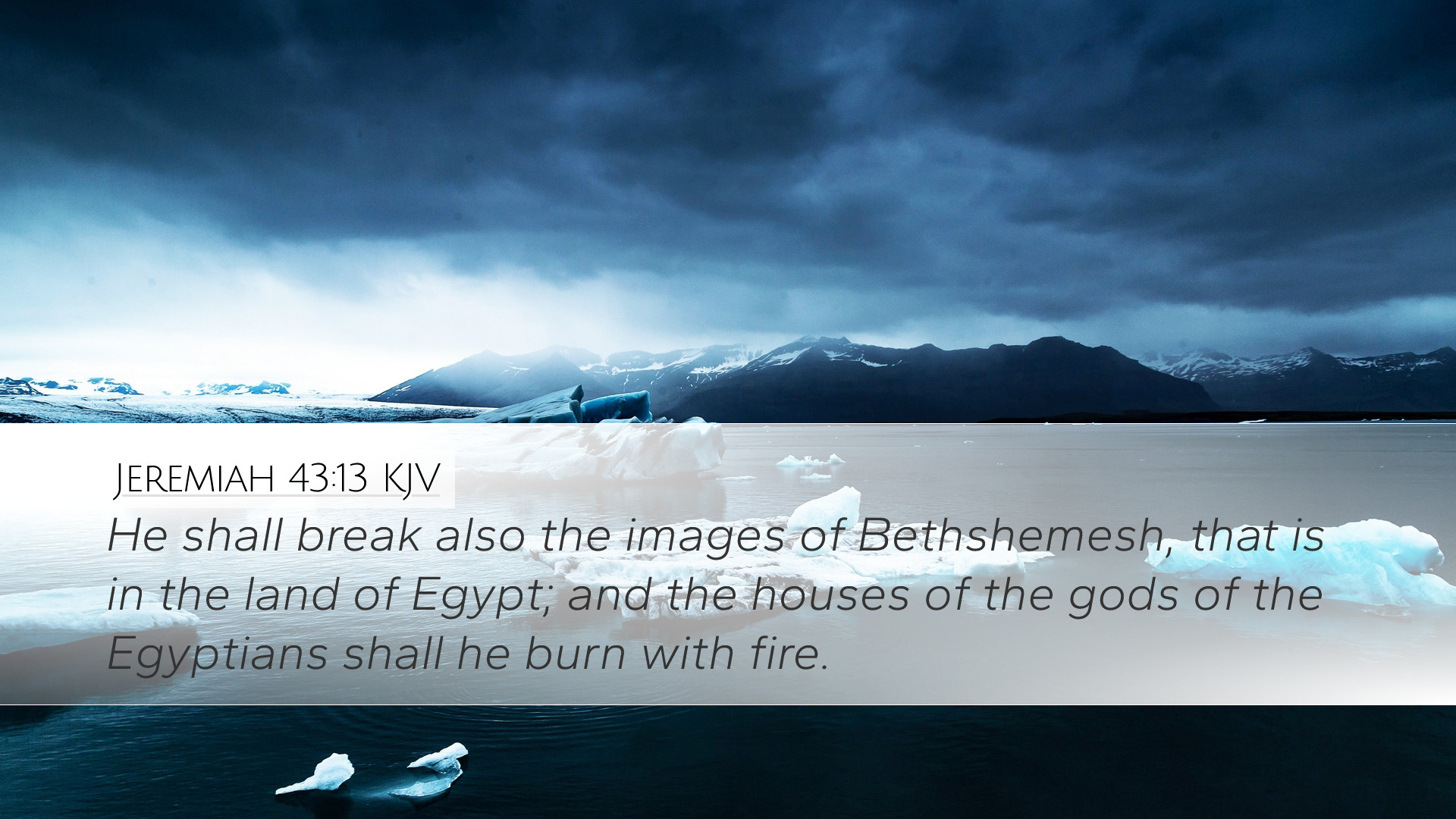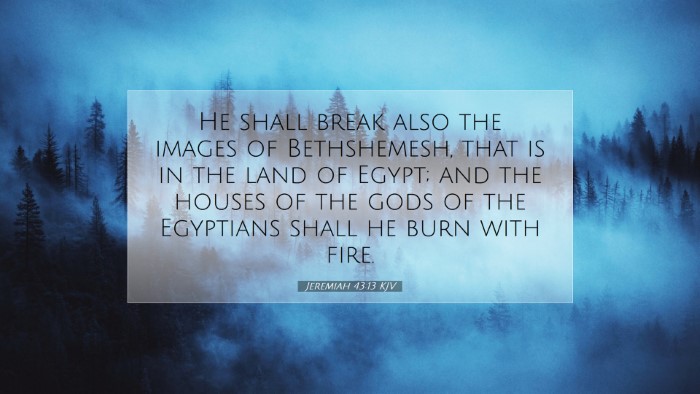Commentary on Jeremiah 43:13
Jeremiah 43:13 states, "And He shall break also the images of Beth-shemesh, that is in the land of Egypt; and the houses of the gods of the Egyptians shall He burn with fire." This verse marks a significant moment in the prophetic narrative of Jeremiah, reflecting the divine judgment against idolatry and the false gods of Egypt.
Contextual Overview
The Book of Jeremiah is situated during a tumultuous period in Israel's history, characterized by political upheaval and moral decay. After the fall of Jerusalem to the Babylonians, many Jews fled to Egypt, seeking refuge. Jeremiah, as God's prophet, was compelled to follow them and deliver God's message about impending judgment on both Israel and the nations around them.
Thematic Insights
This verse encapsulates several key themes that are prevalent throughout Jeremiah’s writings:
- Divine Judgment: The imagery of "breaking" and "burning" signifies God's active role in dismantling idolatry.
- God's Sovereignty: The destruction of the Egyptian gods illustrates God's supremacy over all nations and deities.
- Idolatry and its Consequences: This segment serves as a stark warning against the worship of false gods and the dedication to practices contrary to God's will.
Commentary Insights
Matthew Henry highlights that this act of breaking the images signifies the ultimate triumph of God over the idols of Egypt. He notes that the Egyptians had long been known for their polytheistic practices, and through this prophecy, God addresses their reliance on these false gods. The destruction is not merely physical but speaks to a spiritual reality where God eliminates the rivals to his authority and worship.
Albert Barnes observes that the term “Beth-shemesh” symbolizes the sun god worshiped by the Egyptians. By mentioning specifically the gods of Egypt, Barnes underscores that these were nations that had opposed God’s people and remained in rebellion. The act of burning the houses of these gods is not just symbolic of desolation but also signifies a coming judgment that demonstrates God's displeasure regarding the idolatrous practices.
Adam Clarke elaborates on the implications of divine judgment as a means to restore a rightful order. He suggests that God’s intention is not solely punitive but redemptive, aiming to turn the hearts of the people from their false beliefs back to Him. Clarke argues that this verse serves as a reminder that God's wrath against sin is consistent throughout Scripture, urging believers today to examine their allegiances and idols.
Theological Implications
For pastors, theologians, and Bible scholars, Jeremiah 43:13 offers profound insights into God's character and His dealings with humanity. It calls for a reflection on the following theological themes:
- The Nature of God: God is portrayed as righteous and just, exercising judgment upon those who set up false idols in opposition to Him.
- Historical Context: Understanding the geopolitical realities of Jeremiah's time enriches the interpretation of divine messages as God interacts with specific historical circumstances.
- Relevance to Contemporary Faith: The burning of idols parallels modern-day idols, prompting discussions about what forms of idolatry exist in contemporary society and how individuals can be led back to true worship of God.
Practical Applications
In light of the truths found in Jeremiah 43:13, several practical applications can be drawn:
- Self-Examination: Believers are called to examine their own lives for any forms of idolatry that may have taken root, intentionally seeking to remove these distractions from their worship of God.
- Encouragement in Ministry: For those in pastoral roles, this passage serves as an encouragement to boldly proclaim God's message in both judgment and grace, seeking to guide their congregations away from false hopes.
- Prayer and Intercession: Communities of faith are invited to pray for those caught in the cycle of sin and idolatry, understanding that God's desire is for restoration rather than condemnation.
Conclusion
Jeremiah 43:13 stands as a powerful verse depicting God's authority over idolatry, His sovereign judgment upon nations, and His longing for His people to return to Him. The combined insights from prominent commentaries encourage readers to delve deeper into the layers of meaning within this scripture, fostering a richer understanding of God’s nature and inspiring a commitment to faithful worship.


